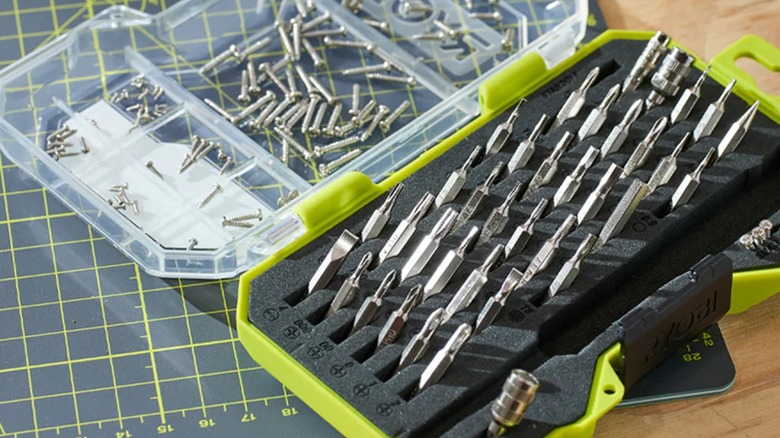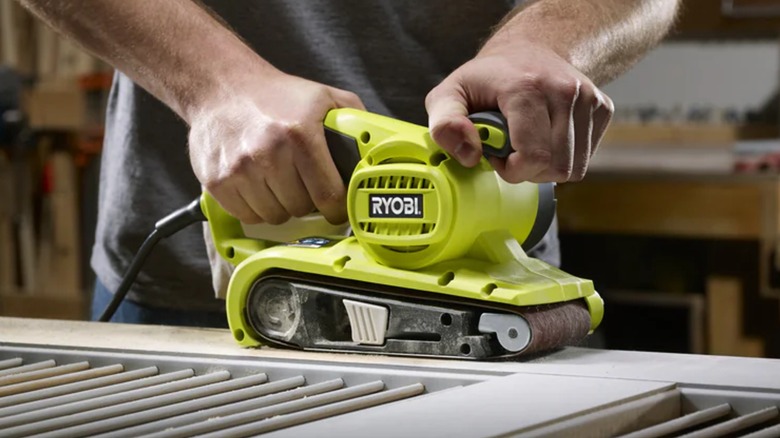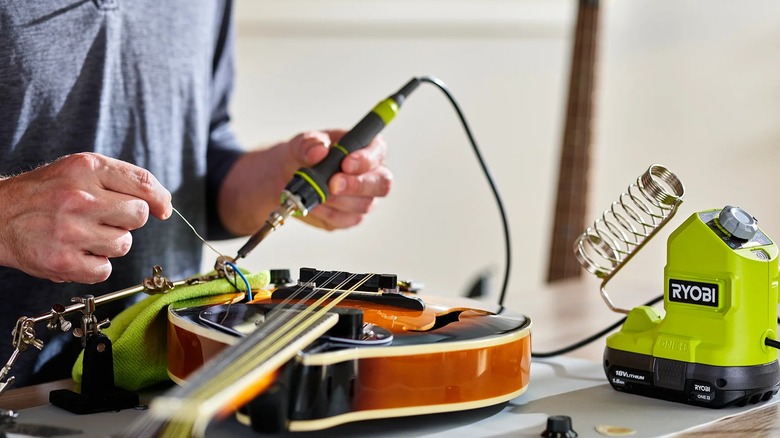These 3 Ryobi Tools Changed The Way I Approach DIY Projects
Throughout my life, I've considered myself an avid tinkerer and builder. Whether it was making creations out of Lego growing up or taking electronics apart to see how they function, I've always found great joy in such activities. With that said, only in recent years, and especially after buying my first home, have I taken such efforts more seriously. This has led to me to take on more daring DIY efforts and seek out the proper tools to get such jobs done. Like everyone right now, I am on a budget, so I've had to be smart about which tools I add to my arsenal and from which brands I buy from.
One of the brands that has met my needs while simultaneously taking it relatively easy on my wallet is Ryobi. For the experienced tradesperson, this isn't likely a brand to reach for. Not only are Ryobi power tool batteries burdened with some common problems, but their tools are generally thought of as "good enough" in terms of quality and performance. While I admit it's not typically my go-to brand, the several tools from it that I have used over the years have served me well. They've held up just fine, the prices weren't too bad, and they made my various endeavors go just a bit smoother.
In fact, there are a few Ryobi tools worth highlighting as particularly strong. These specific few have previously made or continue to make a huge difference in my DIY projects.
Ryobi's precision screwdriver kit certainly comes in handy
As touched on, a lot of my DIY hobby projects have revolved around technology. Common examples include repairing video game tech and reviving old electronic toys — tasks that generally aren't too complicated or labor-intensive but can be made easier with the right tools. Naturally, the first step is to open them up, which can prove difficult with a drill or large screwdriver when you're dealing with small, uniquely-shaped, or old and fragile screws. So, with such hardware, I needed versatility and precision in my screwdrivers, which Ryobi was more than capable of providing to refine my approach.
I've found the Ryobi 38-piece precision screwdriver set to be a great purchase. As the name implies, this set is full of different screwdriver bits, 37 to be exact, which extend far beyond your typical flathead and Phillips-head bits. I've had my set for some time now, and, with a use frequency of about once or twice a week, the bits have held up fine with no breakage or warping. The bits and screwdriver they connect to skew small as well, making them ideal for working on electronics where room to work can be limited. The case they come in is handy, too, with the lid serving as the perfect place to keep loose screws while I work.
This set can typically be found for under $15. It may not be an exceptionally high-tech or heavy-duty Ryobi product, but in my experience, it's undeniably a helpful one.
Ryobi's corded belt sander was a DIY lifesaver
One of my bigger first-time homeowner projects was to redo the floors in my office. They were covered by cheap carpet, but I wanted to show off those real-deal hardwood floors hidden underneath. Not only was clearing everything out of the room and tearing up the carpet, foam, and staples a daunting enough task, but the hardwoods were in serious disrepair. Thus, I was left with no choice but to sand them down, freshen the stain, and reseal. It isn't a terribly big room, so I figured my orbital hand sander (not to be confused with a random orbital sander) would do the trick, even if the process was a bit time-consuming. Suffice to say, I was woefully wrong, so I purchased a belt sander.
Completely overlooking the fact that I already owned a belt sander that was sitting in plain sight in my garage, I opted for the Ryobi 3-inch by 18-inch belt sander. While the cord was a bit unwieldy at times, for around $100, I couldn't complain. I got the entire room sanded in two days, using roughly four sanding belts by the time it was all said and done. It delivered enough power to get the old finish removed and worked well on deep scratches and the odd protrusion in the wood. The dust bag helped with cleanup before staining and eventually sealing as well. If the project were any bigger, it probably wouldn't have been as ideal, but in this case, it was a fine fit.
Following the completion of the floor project, I used this belt sander here and there for other efforts. At this point, I can't imagine attempting such a sanding-heavy DIY effort without one.
Ryobi's soldering kit took some of the tedium out of soldering
When I initially decided to try soldering, I didn't take it very seriously. I had an old Xbox controller I wanted to repair, and, to my detriment, I cheaped out on my soldering iron and solder. The unit had no temperature control, and the solder didn't take to the wiring as smoothly as I'd hoped, resulting in a controller that worked, albeit with a cord that wasn't too pleasing to the eye. Then I realized if I were to keep honing my soldering skills, I'd need the proper equipment. While I didn't necessarily go out in search of a Ryobi soldering iron, that's what I wound up with, and I wasn't disappointed.
I bought the 18-volt ONE+ 120-watt soldering iron kit, and it turned out to be a vast improvement over the cheap, bare-bones soldering iron set I had before. The biggest game-changer was the temperature dial, which allowed me to adjust how hot the iron would get. This made it much easier to use the solder and have it take to whatever it is I'm soldering much easier. The stand, temperature indication LEDs, and handle design are all pluses. It was a bit expensive, running in the neighborhood of $90 — likely primarily thanks to the 18V ONE+ 1.5Ah battery included in the kit — but for those uses I got out of it, it paid itself off in my view.
Ryobi has never been a go-to for me, not out of dislike but simply because I don't tend to restrict myself to a single tool brand. At the same time, these tools and others haven't done me wrong, and I look forward to trying out some of Ryobi's newly released DIY-friendly tools down the line.



